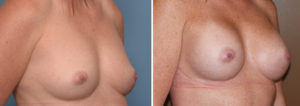Now that silicone breast implants are back for breast augmentation, they are rapidly becoming the preferred implant over saline for primary breast augmentation. Due to their more natural feel, lack of implant rippling, and lower risk of detectable implant failure, they now represent 90% of implants that I put in for breast augmentation. One of the many ‘safety’ questions that arises with the use of silicone breast implants for younger women is……do they interfere with the potential for breast feeding?……and will any silicone ‘leak’ into the breast milk and potentially harm my baby?

The blood and breast milk chemistries (content) of women with silicone implants has now been studied and published. The definite work to date on this subject entitled ‘Breast-Feeding and Silicone Implants’ appeared in the Supplement to the journal Plastic and Reconstructive Surgery, December 2007, entitled Silicone Breast Implants: Outcomes and Safety. In his study, women with silicone breast implants were compared to women without breast implants and showed that the mean silicon levels were not different in these two groups in either their breast milk or in their blood. Interestingly, silicon levels in other methods of infant nutrition, such as store-bought cow’s milk and commercially-available infant formulas, were much higher. Cow’s milk had a nearly 10 fold increase in silicon levels and commercial infant formualas were as high as 50 times greater!
It would be fair to say based on this evidence that silicone breast implants pose no significant known risks to breast feeding. Our clinical experience would back this finding as well.
Dr Barry Eppley
Indianapolis, Indiana


